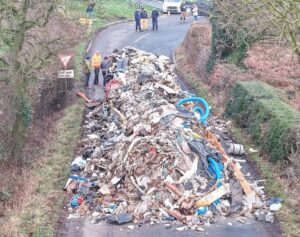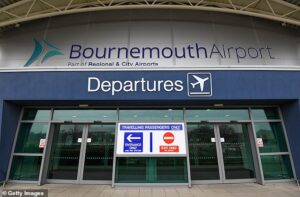By NEIL SEARS ON GRAVELINES BEACH, NEAR CALAIS
Published: | Updated:
Three migrant dinghies left from just one French beach alone this morning – in defiance of riot police and Labour’s new migrant returns deal.
Yesterday Keir Starmer‘s much-trumpeted one-in, one-out ‘deterrent’ policy came into force.
But it appeared to be having no effect this morning.
In astonishing scenes demonstrating the scale of migrant departures to England, four separate groups of migrants ran on to the sweeping sands at Gravelines, near Calais, just after 7am.
The groups were mainly men, but also included women, with one carrying a little boy sucking on a blue dummy. Another man carried a child on his shoulders as he waded into the waters.
The groups spread over a mile of shoreline, gathering in three bunches, with one bunch stood a little back on the beach, and the other two groups in the water up to their waists. They were waiting for ‘taxi boat’ dinghies coming to collect them.
All this under the noses of two dozen police, who had arrived on the sand some time after the Daily Mail, but before any of the migrants emerged from the extensive dunes behind the shore.
At first, the officers were an impressive sight, striding along the front of the dunes in a long line, riot shields glinting in the early morning light, tear gas launchers brandished high.
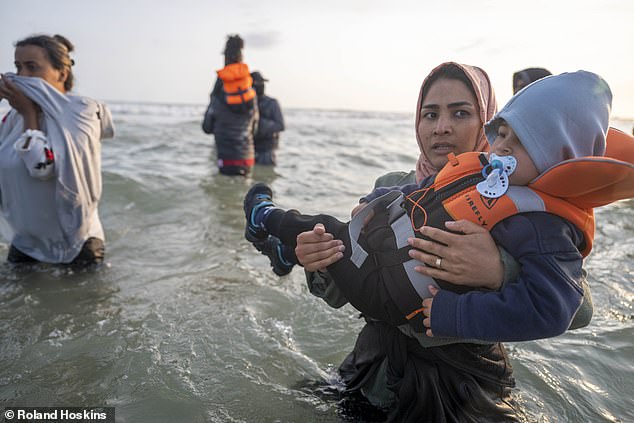
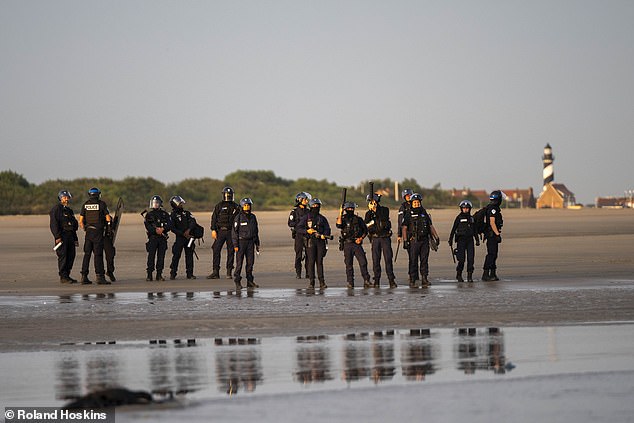
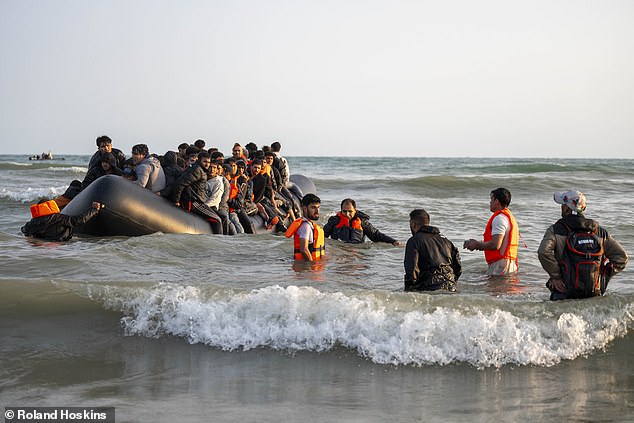
A Police Nationale sand-coloured Land Cruiser sped up and down the huge expanse of sand too, occasionally venturing into the high dunes.
But when the four large groups of migrants started running the 800 yards to the water-line, it made a mockery of police attempts to stop them.
It would have taken ten-times as many police to have any hope. No tear gas was fired, probably because it would have instantly dispersed in the brisk winds coming in from the sea, and the migrants were anyway dispersed over such a wide area.
And while Gravelines is perhaps the favourite launch-spot for people smugglers’ dinghies, there are of course numerous other beaches spread over some 100 miles of coastline, from the Belgian border to Le Touquet, Berck, and beyond to the south.
Here, the people smuggling gangs and the migrants typically paying £1,200 a fare for their places on these ‘taxi boats’ were launching apparently at will, after several days of no launches due to poor weather.
In theory, under Labour’s new deal the first small boat arrivals could be detained as early as today for possible removal to France.
The deal will see migrants who came here illegally across the Channel exchanged ‘one for one’ with others still in France.
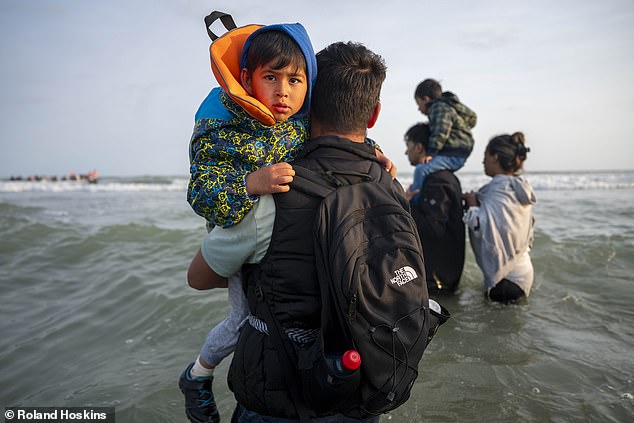
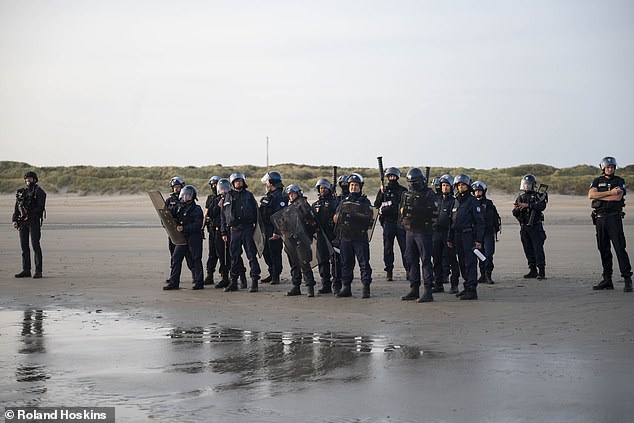
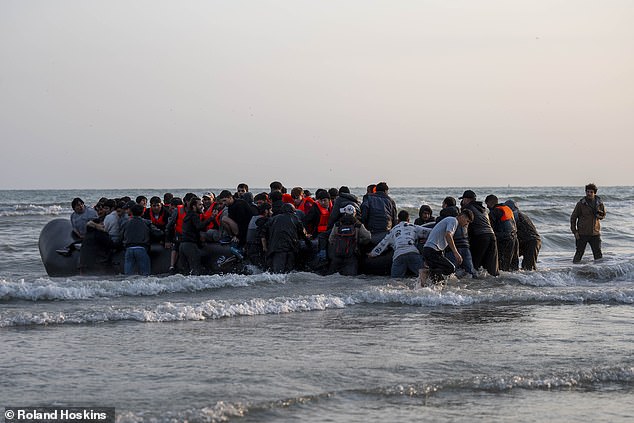
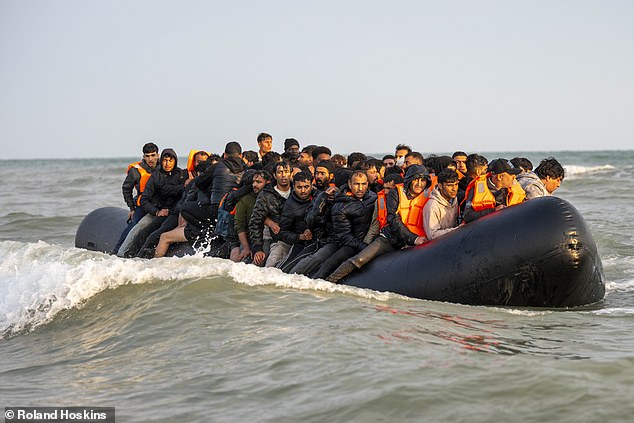
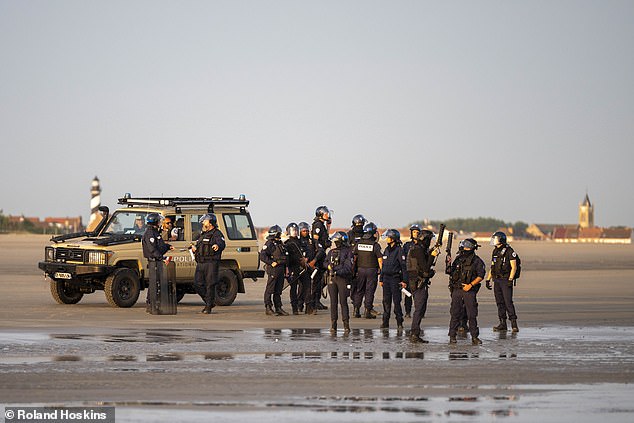
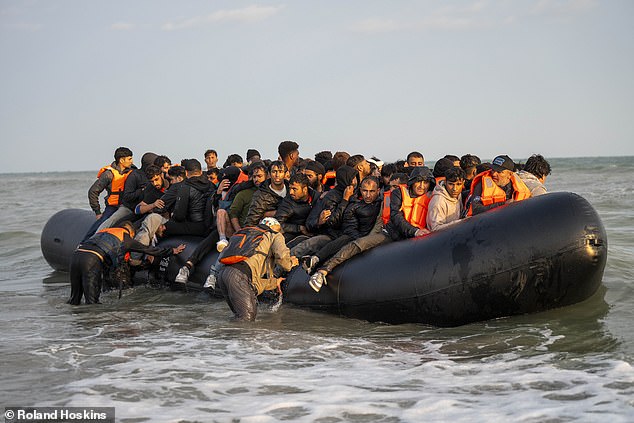
Migrants in France will be flown to Britain by the Home Office and handed a visa to live here for up to three months after successfully applying while their final application is considered.
But it emerged yesterday that small boat migrants who lodge human rights claims in Britain will evade being returned to France in an extraordinary loophole.
It opens up the prospect of human rights lawyers encouraging migrants to lodge spurious claims simply to avoid being earmarked for removal.
But this morning, the deal seemed to be having little impact.
Once the migrants had reached the sea, and were stood in their separate groups strung along the wide beach here, the riot police did precisely nothing.
The majority of the officers stood together in one large group, still holding tear gas launchers and riot shields, but not doing anything with them.
They simply watched as the largest of the migrant groups, on the east end of the beach, patiently awaited the first of two taxi boats.
We had seen the first 30ft long dinghy arrive from the western, Calais side of Gravelines, at 6.30am. It chugged parallel to the coast, as much as a mile off shore, as if towards Belgium.
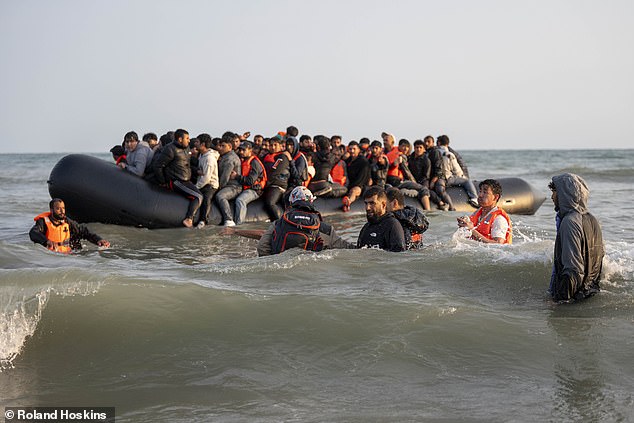
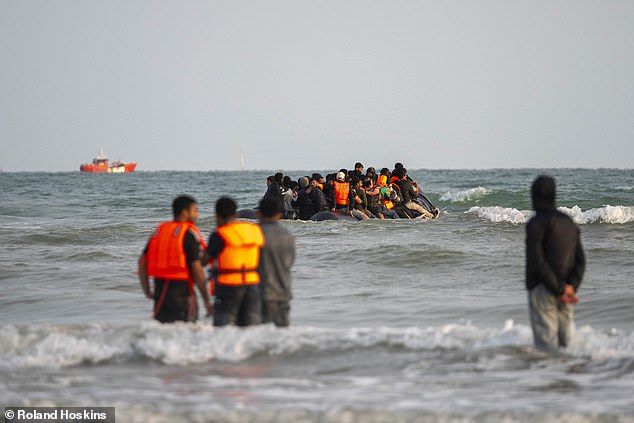
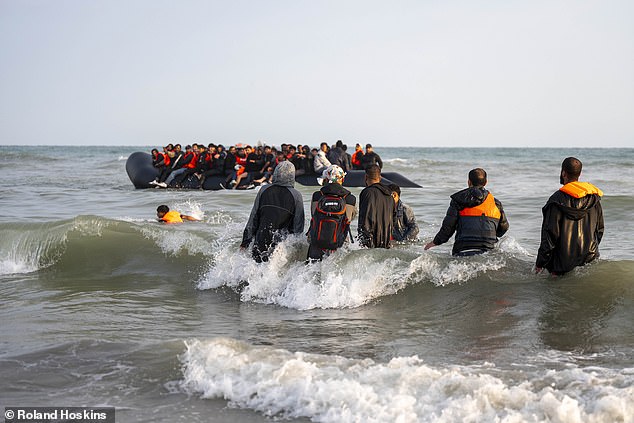
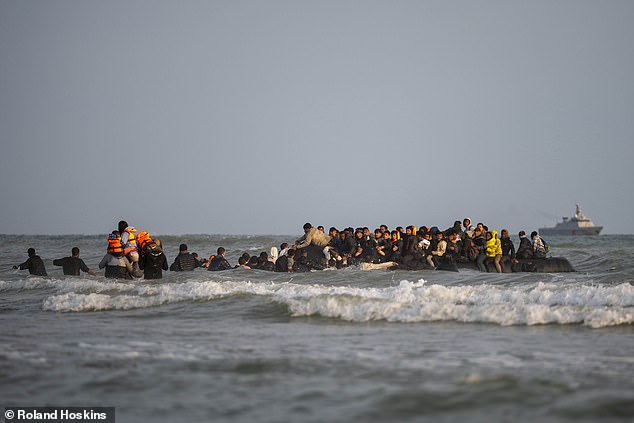
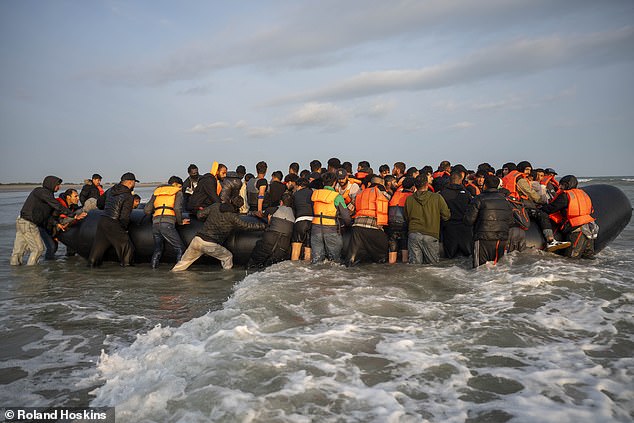
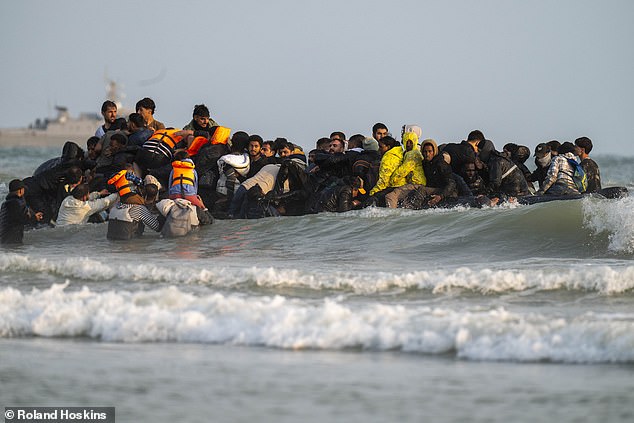
There were already maybe 40 men aboard, sat on the sides, an unusually high proportion wearing bright-orange life jackets. To anyone concerned about health and safety, it was full.
But to the people smugglers, and indeed the migrants whose hearts are set on England, there was room to cram 40 more in the middle.
It loitered way off the beach for half an hour, with the riot police arriving and heading eastwards in front of the dunes in an apparent bid to head off any migrants, as yet out of sight, hoping to be picked up.
It soon became obvious it was a hopeless police effort, when the migrants suddenly emerged either side of the officers, in their four separate groups – one simply walking down the side of the canal to the sea from where many dinghies here emerge.
The other three groups of migrants came out of the dunes, one close to the canal and town of Gravelines on the west of the beach, the other two from the dunes to the east.
Many ran, but not those close to the canal – it is hard to run with a toddler on your shoulders, and some half a dozen men in this group had just that.
By shortly after 7am there were some 120 migrants at the shoreline or already in the sea.
Then the first taxi boat dinghy pulled close to two merged groups on the shore on the eastern end of the beach, and around two thirds of the 60 there climbed aboard.
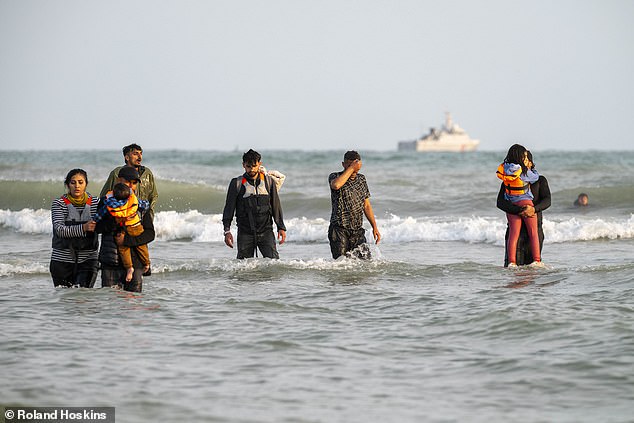
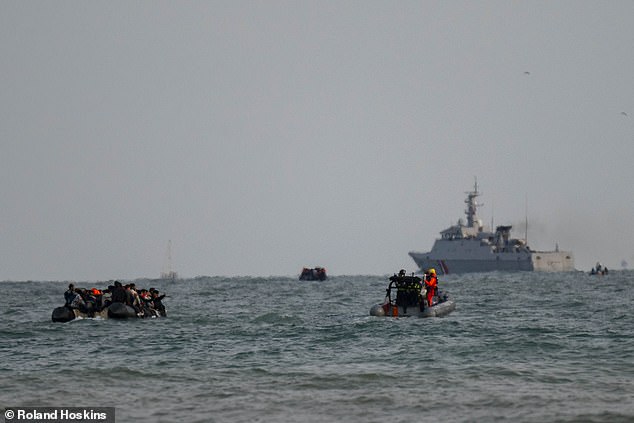
It only took them a couple of minutes to board, but turned into a lengthy process as, amid significant waves, some were told to leave, and others manhandled the dinghy to point towards England. And all while the police watched from 50 yards away.
As that first boat headed for Dover, a second dinghy emerged from the end of the Gravelines’ sea canal, fully laden – and without turning set off straight for England.
But then a third dinghy arrived from the west. Again, it had some 40 men already aboard, but chugged towards the western end of the beach, and collected around half of the 60 migrants waiting there, including some of the toddlers.
Two police officers watched from beside their Landcruiser, but the riot squad did not even run to get close.
Within minutes this third dinghy had followed the other two towards England, leaving several dozen migrants to trudge disappointedly back towards the bus stop, and bus, towards their camp a few miles away, having been told their boats were too full.
Afghan migrant Achmed, 28, was left standing on the sand with his son Mustafa, two, on his shoulders, and wife Moska by his side.
Achmed said: ‘We were supposed to go to the UK today – I’ve been here four or five days, and it still hasn’t happened.
‘They said this boat was too full, with about 80 persons already. We are paying 2,000 Euros each.’
When will he try again?
‘Maybe tomorrow.’


